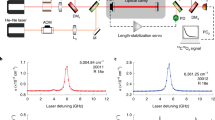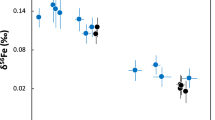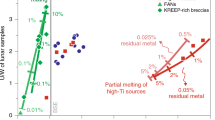Abstract
Bugry and Shaw direct attention to interference of the widely used boron line at 2497.73 Å by an iron line at 2497.82 Å. They clearly demonstrate that iron interference seriously compromises results obtained from samples rich in iron (8 per cent Fe2O3) and low in boron (∼ 30 p.p.m. boron). They suggest that iron correlates positively with K2O (and hence illite) in shales; and conclude that many published boron determinations might be in error and that iron interference might explain the observed positive correlation between K2O and boron in argillaceous materials.
This is a preview of subscription content, access via your institution
Access options
Subscribe to this journal
Receive 51 print issues and online access
$199.00 per year
only $3.90 per issue
Buy this article
- Purchase on Springer Link
- Instant access to full article PDF
Prices may be subject to local taxes which are calculated during checkout
Similar content being viewed by others
References
Frederickson, A. F., and Reynolds, R. C., Clays and Clay Minerals, Proc Eighth Nat. Conf., 202 (1960).
Walker, C. T., J. Sed. Pet., 33, 694 (1963).
Walker, C. T., and Price, N. B., Bull. Amer. Assoc. Pet. Geologists, 47, 833 (1963).
Reynolds, R. C., Geochim. Cosmochim. Acta, 27, 1097 (1963).
Author information
Authors and Affiliations
Rights and permissions
About this article
Cite this article
REYNOLDS, R. Unreliable Boron Analyses in Palæosalinity Investigations. Nature 201, 1315–1316 (1964). https://doi.org/10.1038/2011315a0
Issue Date:
DOI: https://doi.org/10.1038/2011315a0
This article is cited by
Comments
By submitting a comment you agree to abide by our Terms and Community Guidelines. If you find something abusive or that does not comply with our terms or guidelines please flag it as inappropriate.



